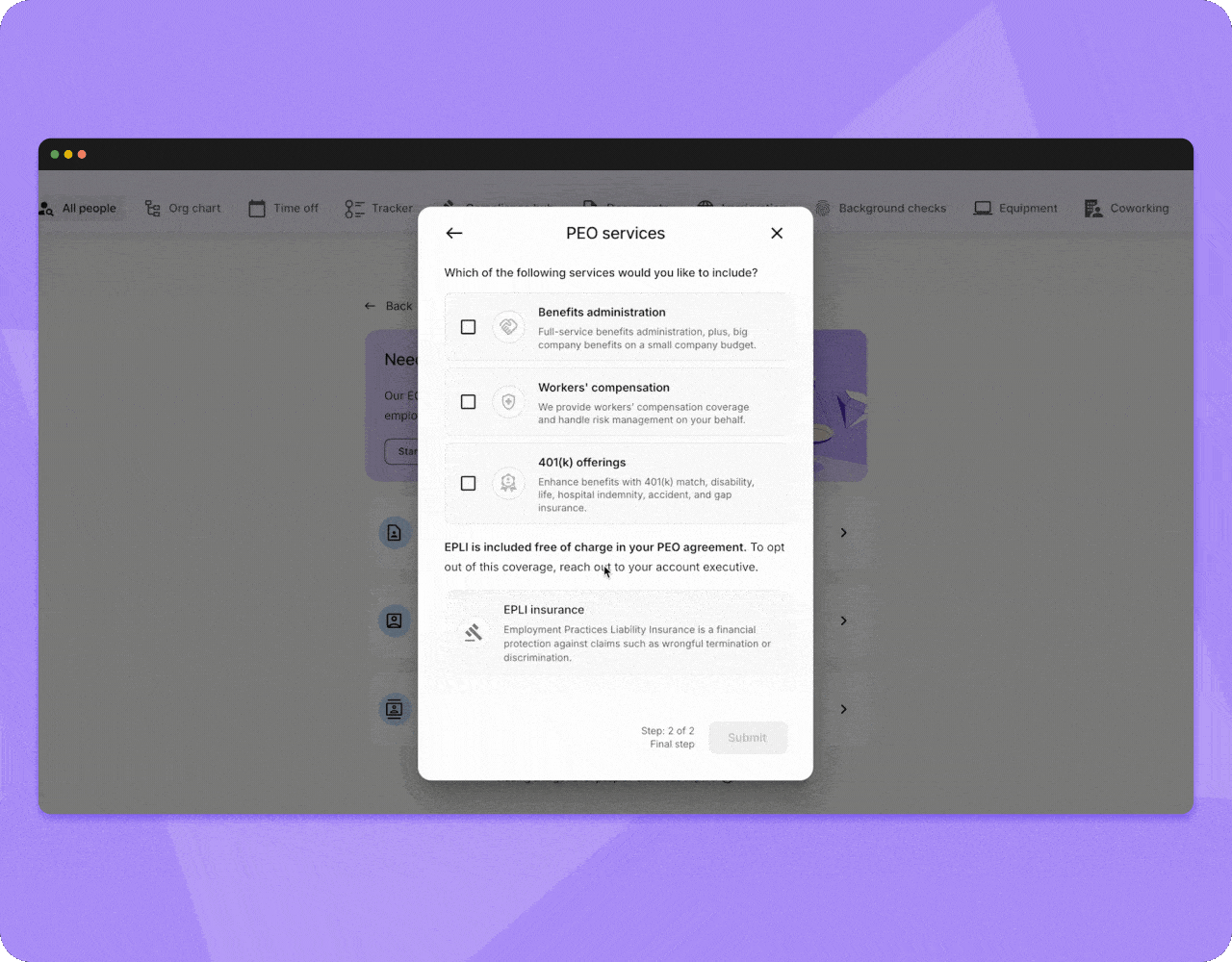Article
8 min read
What is a PEO in Arizona? Streamline Payroll, Compliance, and Benefits
PEO

Author
Shannon Ongaro
Last Update
July 18, 2025

Table of Contents
How does a PEO work in Arizona?
What notifications are required for Arizona PEOs?
What compliance documents do Arizona PEOs provide?
What are the benefits of partnering with a PEO in Arizona?
Payroll, labor, and employment laws in Arizona
Additional requirements and enforcement
Manage your Arizona, US, and global workers with Deel
Key takeaways
- Arizona PEOs manage local payroll, SUTA filings, and workers’ comp, sharing legal liability.
- PEOs unlock volume‑discounted benefits packages that help attract and retain talent.
- Delegating HR and payroll tasks to Deel PEO frees finance teams to focus on strategic initiatives.
A PEO in Arizona is a co‑employment partnership where a licensed provider manages payroll, state tax filings (including SUTA), workers’ compensation, and HR compliance, allowing you to outsource routine admin tasks and gain access to more competitive benefits.
Learn how Deel simplifies PEO partnerships in Arizona.
How does a PEO work in Arizona?
Partnering with a professional employer organization (PEO) creates a co‑employment relationship: the PEO assumes HR, payroll tax, and compliance liabilities, while you retain direction over daily operations.
What notifications are required for Arizona PEOs?
Arizona PEOs must notify the Industrial Commission of Arizona (ICA) and their insurance carrier when onboarding a client, though no state license is required, the ICA monitors all PEO activities to prevent SUTA dumping.
What compliance documents do Arizona PEOs provide?
PEOs must supply key forms to employees and regulators:
- Form W‑4: Federal withholding status
- Form I‑9: Work authorization verification
- PEO Arbitration Agreement: Dispute resolution via arbitration
- Employee Communications Consent: Official communication methods
- WSE Notice of PEO Relationship: Worker rights and roles
- Arizona State Tax Form and Employer Information for Employees

What are the benefits of partnering with a PEO in Arizona?
Extra efficiency
Outsource HR tasks to experts, avoid hiring overhead, and leverage advanced HR technology for payroll, tax withholding, and benefits enrollment.
Access to expertise
Mitigate legal and financial risk with seasoned compliance specialists, which is often more cost‑effective than in‑house hires.
Affordable benefits plans
Gain volume purchasing power for health, retirement, and workers’ comp plans, meeting Arizona’s legal requirements at better rates.
Compliance support
Stay ahead of evolving Arizona labor laws and high‑profile rulings. For example, Arizona recently concluded a high-profile court case over workers’ compensation. The state ruled that the company owed benefits after an employee likely contracted COVID-19 on the job.
Payroll, labor, and employment laws in Arizona
Arizona laws often go beyond federal requirements, imposing additional regulations and standards for employment. When you partner with a PEO, it becomes their responsibility to maintain continuous compliance with these rules.
Here’s an overview of the main payroll, labor, and employment laws in Arizona:
Payroll and benefits laws in Arizona
| Topic | Details |
|---|---|
| Minimum wage | Arizona’s minimum wage is $14.70/hr for 2025; up to $3/hr tip credit if employees regularly receive tips. Adjusted annually for inflation. |
| Exemptions | Businesses with < $500,000 annual revenue and public sector entities are exempt from the state minimum wage requirement. |
| Disclosure | Employers must print and display the Fair Wages and Healthy Families Act poster in a conspicuous location. |
| Paid sick leave | Employees accrue 1 hour per 30 hours worked (up to 40 hours/year), paid at their regular rate. See Arizona sick leave rules. |
| Pay transparency laws | No requirement to post salary bands, but employers cannot penalize candidates for inquiring about pay. |
| Record keeping | Must retain accurate payroll and PTO records for 4 years. Failure presumes underpayment; penalties range $250–$1,000 per violation. |
| Paydays and pay periods | At least 2 fixed paydays/month, no more than 16 days apart; all wages due up to each date must be paid. |
| Final paychecks | Terminated employees: within 7 working days; resignations: on next regular payday. |
| Deductions | Any payroll deduction requires written authorization from the employee, government, or court. |

Arizona labor laws
| Topic | Details |
|---|---|
| Meal and rest breaks | No state‑mandated breaks. If workers are on duty during breaks, they must be paid for that time. |
| 24‑hr on‑duty rules | For shifts over 24 hours, employers may exclude meal and sleep periods if they provide 8 hours of uninterrupted rest accommodations. |
| Residential employees | On‑site residential workers need not be paid for periods when they are free to leave the premises. |
| Workers’ compensation | All employers must provide workers’ compensation insurance; they may choose the initial treating physician. |
| Overtime | Arizona defers to federal FLSA: 1.5× pay for hours worked over 40 hours/week. |
Arizona employment laws
| Topic | Details |
|---|---|
| Worker classification | Defined by financial control and oversight criteria. See GOA guidelines to determine employee vs. contractor status. |
| DIBS form | Employers may use the Declaration of Independent Business Status (DIBS) to confirm contractor relationships before work begins. |
| Disability accommodations | A disabled worker is entitled to minimum wage if they can perform duties independently; exemptions apply only for self‑benefit roles. |
| Background checks (“ban the box”) | EO 2017‑07 prohibits state agencies from asking about criminal history until after an initial interview to improve hiring equity. |
Deel PEO
Additional requirements and enforcement
One notable law in Arizona is the unemployment tax. All employers must open an account, report their wages, and make contributions. The exact rates depend on the size of their payroll and benefits for the year.
When you use a PEO, they’re required by law to manage unemployment insurance for your workers. The state treats them as the employer in this instance.
Sometimes Arizona state overlaps with federal laws. Employers must always comply with the regulations which afford workers the most rights and advantages.
Manage your Arizona, US, and global workers with Deel
Deel’s in-house PEO is built to support fast-growing teams with the tools, coverage, and service they need, all in one platform.

Fully in-house support
Deel PEO is run entirely by internal specialists, including certified professionals, licensed advisors, and dedicated HRBPs. Clients get direct access to expert guidance across payroll, benefits, and compliance, with no third-party handoffs or delays.
Benefits admin made easy
Admins can choose, enroll, and manage health benefits for US employees directly in the Deel platform. They can view costs, track coverage, and handle renewals—all in one place, without chasing brokers or juggling paperwork.
Exclusive access to Aetna International plans
For teams with globally mobile employees, Deel is the only PEO to offer Aetna International health plans, ensuring continuous coverage across borders without needing to manage separate providers.
All-in-one platform
Admins can manage hiring, onboarding, payroll, and benefits in one place. Deel simplifies every step, from enrollment to renewals, reducing HR admin time.
Compliance coverage at every level
Deel helps businesses meet federal, state, and local employment laws, taking the guesswork out of US HR compliance.
Book a demo to learn more about using Deel’s PEO in Arizona.
FAQs
How much does PEO services cost in Arizona?
PEO pricing varies by headcount, payroll frequency, and service level—typically a flat fee per employee per month plus a percentage of payroll.
How to choose the right PEO in Arizona
Arizona’s complex laws and regulations mean you need to take a strategic approach to choosing a PEO. Here’s a seven-step guide to finding a provider that suits your needs and interests:
1. Define your business needs
Start by analyzing your current HR processes to look for areas of inefficiency or potential cost savings. Think about both your immediate needs and future goals.
Decide which services you’re likely to need from the PEO, for example, payroll processing, benefits administration, and compliance. Again, consider how these needs may change as your company evolves and grows.
2. Research PEOs with Arizona expertise
Look for Arizona PEO services with a strong presence and a proven track record. As the state doesn’t have licensing, they can’t regulate providers as closely as many other states. That’s why it’s essential to verify your PEO’s credentials before committing to a partnership.
To check a potential PEO, search for case studies, client testimonials, and examples of how they’ve handled compliance for other companies.
3. Evaluate the value of services and benefits
Explore the services each PEO offers to see whether they’ll meet your requirements. In particular, check whether the benefits packages provided are comprehensive yet affordable. These packages can help you attract and retain top workers in Arizona.
Also, look at how well the PEO can adapt to your unique setup. For example, is their software user-friendly? Can you easily implement it across your entire company?
4. Assess compliance and risk management capabilities
Learn about how the PEO stays updated with state and federal regulations and communicates with their client companies. They should be able to demonstrate a proactive approach to compliance and risk mitigation.
For instance, Deel has a Compliance Hub with essential updates about changing laws and regulations from the US and beyond.
5. Check customer service and support
Research the PEO’s support options, availability, and wait times. Compliance issues often require a fast response and expert guidance so they don’t escalate.
Check whether you’ll have a dedicated team or account manager who can familiarize themselves with your business and tailor their support to your needs.
6. Review and negotiate the contract
Carefully read the contract and double-check you understand all the terms of the agreement. Get a legal professional to guarantee everything is in your company’s best interests, if needed. Ensure the contract clarifies your and the PEO’s responsibilities in every scenario, including fees and exit clauses.
7. Plan for implementation and transition
Notify your team about the upcoming changes and explain the benefits of using a PEO service. Give staff opportunities to ask questions and provide feedback.
Agree on a transition timeline with the PEO provider including meetings, updates, and data transfers. You can guarantee a smooth transition while laying the groundwork for a strong partnership.
See also: How to choose a US PEO
Is co‑employment riskier for small businesses?
Shared liabilities can actually reduce risk: the PEO’s insurance and compliance teams absorb many exposures, while you retain operational control.
Can I switch PEOs mid‑year?
Yes, most PEOs support transitions at any time, but check for minimum‑term commitments and data‑transfer processes in your contract.
See also: Leaving a PEO: How-to Guide and PEO Exit Checklist
What notifications must an Arizona PEO make?
PEOs must notify the Industrial Commission of Arizona (ICA) and the relevant insurance carrier when they begin serving a client. No state license is needed, but reporting prevents SUTA dumping.
How do PEOs handle SUTA dumping?
Arizona prohibits the use of client data to secure lower unemployment rates. PEOs file all SUTA under their own account to ensure compliance with the State Unemployment Tax Act.
Which forms are mandatory for PEO employees?
PEOs must issue Form W‑4, Form I‑9, arbitration agreements, communications consent, WSE notices, state tax forms, and employer info forms to every employee.
Disclaimer: Informational purposes only; not legal advice. Consult a licensed attorney for guidance.

About the author
Shannon Ongaro is a content marketing manager and trained journalist with over a decade of experience producing content that supports franchisees, small businesses, and global enterprises. Over the years, she’s covered topics such as payroll, HR tech, workplace culture, and more. At Deel, Shannon specializes in thought leadership and global payroll content.















